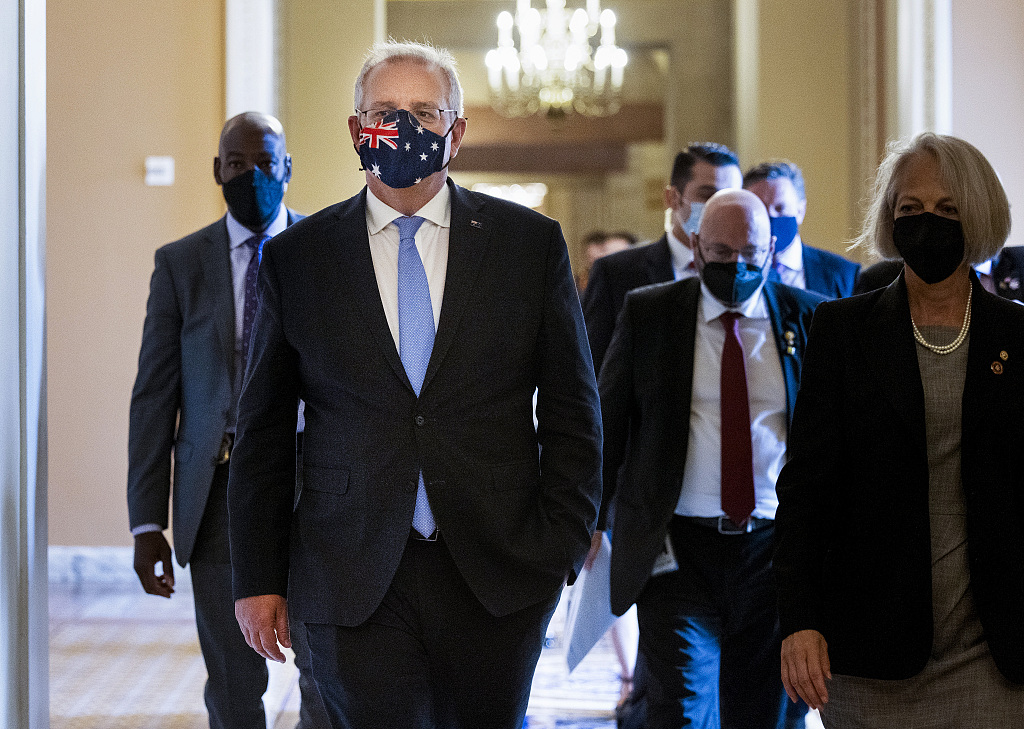
U.S. Secretary of Defense Lloyd Austin and Australian Minister for Defense Peter Dutton stand for their national anthems during an honor cordon at the Pentagon in Arlington, Virginia, U.S., September 15, 2021. /CFP
U.S. Secretary of Defense Lloyd Austin and Australian Minister for Defense Peter Dutton stand for their national anthems during an honor cordon at the Pentagon in Arlington, Virginia, U.S., September 15, 2021. /CFP
Editor's note: Daryl Guppy is an international financial technical analysis expert. He has provided a weekly Shanghai Index analysis for media for the Chinese mainland for more than a decade. Guppy appears regularly on CNBC Asia and is known as "The Chart Man." He is a national board member of the Australia China Business Council. The article reflects the author's opinions and not necessarily those of CGTN.
When it comes to the Australia-China relationship, there are important differences in approach between Australian Defense Minister Peter Dutton and Prime Minister Scott Morrison. The unfolding situation in Ukraine has clarified these differences.
Prime Minister Scott Morrison is driven by an understated and clear religious fervor. He is proud to proclaim that he believes in miracles and the second coming of Christ. This makes him a natural ally of former U.S. Secretary of State Mike Pompeo, who also hailed from the conservative right of the Christian movements. Pompeo's approach to China was framed as a clash of civilizations.
Morrison is also travelling on a well-worn Western path that builds a worldview shaped by Christian moral concepts of good and evil and the need to "convert" people. His comments about the Ukrainian situation reflect these beliefs when he speaks of "evil acts."
Morrison uses China as a way to bolster his domestic political agenda. He is most comfortable with lofty lectures of principle about the rules-based order and liberal democracies banding together to defend democracy and convert China to liberalism.
Right-wing elements in Australia are fellow travelers. The powerful security committee and other conservative anti-China hawks may not all agree with the reasoning behind Morrison's stance in relation to China, but they agree with the final conclusion.
Dutton hails from a state that is infamous for its right-wing conservative thinking and deep hatred of communism. This is Australia's Deep North, the counterpart to America's Deep South.
Dutton's ideological approach is deep-seated and rooted in past Cold War conflict. He brings a McCarthyist approach to the Australia-China relationship. He casts China as an ideological enemy, attempting to subvert or overthrow Australia. Coming from a police background, Dutton is inclined to divide the world between the criminal bad guys and the good guys, with very little room for mercy. There is limited tolerance for conversion.
This is evidenced in his approach to issues where protection visas are refused, children incarcerated in prison camps for years, and people deported for, at times, relatively minor offenses despite having spent all but a few childhood years living in Australia. It's a tough-man, black-letter law and order image he appears to enjoy.

Australian Prime Minister Scott Morrison leaves a meeting in Washington, D.C., U.S., September 22, 2021. /CFP
Australian Prime Minister Scott Morrison leaves a meeting in Washington, D.C., U.S., September 22, 2021. /CFP
His comments about Ukraine reflect strong support for the enforcement of (Western) law and order rather than any moral condemnation.
Dutton's approach to China gives no quarter. The only acceptable outcome is victory rather than compromise, although it's unclear what victory would look like. His record of ministerial decisions shows he has a low opinion of diplomacy and a preference for blunt force solutions. His past activity in these policy areas suggests he has little time for diplomacy and favors a display of virtual force, be it joining U.S. naval exercises or creating an Australian Space Command.
Facing increasing inflation and an inadequate response to a series of natural disasters, the Australian government is making security a leading issue in the election, which must be held in the next 10 weeks. If the Morrison government is re-elected then Australia can expect to see increased attacks on those doing business with China, and on Chinese investments in Australia. It is highly probable that the Foreign Investment Review Board will be further weaponized and force the forfeiture of some existing investments on the grounds of national security.
Australia could expect to see an increase in war-like language that is designed to encourage greater commitment from the United States. The current government clearly knows that Australia by itself has no military credibility when it comes to any significant conflict. Aware of this, the intention is to entangle other so-called allies in a combined confrontation.
Just how far Australia can manipulate U.S. President Joe Biden and the U.S. defense array into prodding and provoking China remains an open question. Dutton finds colleagues and supporters among the U.S. defense establishment, eager to maintain defense spending. He has already welcomed and enabled increased U.S. influence in Australian policy making. His extensive use of reports from the Australian Strategic Policy Institute, which is heavily funded by the U.S., UK and Japanese governments, suggests he is looking for validation of his approaches to China rather than objective assessment of the Australia-China relationship.
Although for different philosophical reasons, both Dutton and Morrison are wombat warriors – bluntly obstinate and undiplomatic.
Dutton's approach to China is all about containment and punishment. He likes the sound of the drums of war. Morrison believes China must yield to a Western-dominated global order because this is his idea of a Christian moral imperative.
China's main concern will be with the degree to which, for whatever reason, Australia can egg-on Biden and Japanese Prime Minister Fumio Kishida and push them toward taking unwise steps that will escalate tensions between China and the region. Outside of this, Australia may find itself largely ignored by the world's largest economy.
(If you want to contribute and have specific expertise, please contact us at opinions@cgtn.com. Follow @thouse_opinions on Twitter to discover the latest commentaries on CGTN Opinion Section.)

